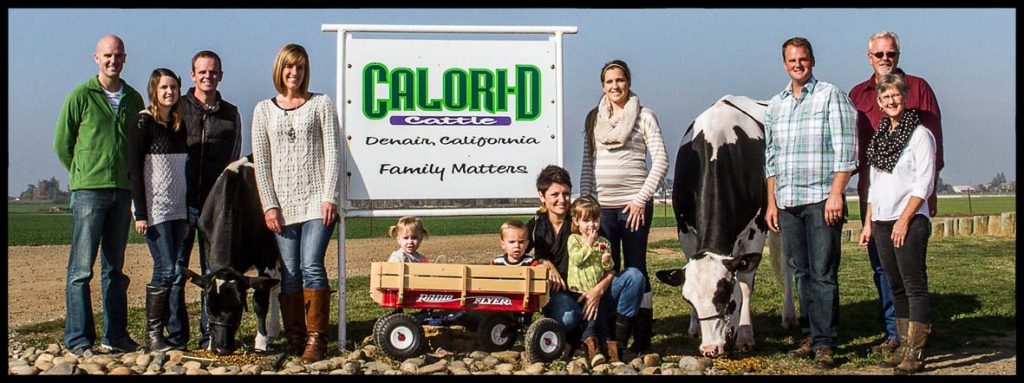
Calori-D Holsteins, Denair, CA
It has been an uncomfortable summer in California’s central valley for many of the region’s over 1.5 million dairy cows. July is typically the hottest month, with its first two weeks averaging between 97 and 101 degrees this year. Regardless of these extreme heat waves, Calori-D Holsteins in Denair, California has proven to be an oasis in the valley heat. A cool breeze and slight mist can be felt while standing between the milk parlor and free stall barn as the many fans and soakers are put to work on a sweltering, July afternoon. In the distance, an employee walks across a cat walk, hosing off the cows below to lower their body temperatures as they enter the parlor.
Although Stephen Mast credits much of his 1000-cow herd’s success to his focus on cow comfort, he also uses an unusual breeding method. Stephen, herd manager of the third-generation dairy, increases the use of genderSELECTed semen during these hot, summer months, while many All West customers tend to cut back.
He recalls a summer similar to this one, only three years ago, when the high temperatures were especially bad during June, July and August. The Mast family did everything they could to keep their cows cool, but Stephen admits they still struggled to get their cows pregnant. “In a normal month here, we get 45-50 heifer calves. But because of that heat, the following April, we only had 18 heifer calves born. It was terrible,” Stephen said.
This lack of heifer calves through the spring raised many concerns for Calori-D Holsteins, as they knew this would result in a lack of heifers calving two years into the future. Stephen contemplated reproductive strategies to fix this issue until he came across our genderSELECTed semen and decided to use it in the summer heat starting in May or June. He and his father, Cal, picked eight bulls with the plan of using them to determine which ones had the best conception rate, then using the best four through the remaining summer months. “We stuck with that plan and ended up getting a ton of heifers pregnant with it through the summer, which results in huge heifer numbers nine months later!” said Stephen.

They were pleased with their results and have continued using this strategy every summer since. Starting in mid-June until as late as October, depending on the temperature, Stephen uses sexed semen on first service in all virgin heifers to offset the cows in the herd not getting pregnant. Stephen noted, “We actually only use sexed semen in the summer because if we used it year-round, it would create too many heifer calves and we simply don’t have the capacity to raise the extra amount of heifers that it would produce.” Starting in April 2017, Calori-D started sending their all baby calves to a calf ranch for the first 120 days due to the need to cut some labor. “In the spring months, we know we are going to be down in numbers of cows calving and therefore try to make up for it with an increase in heifer calves in our first calf heifers,” said Stephen.
Although Stephen admits that the herd still inevitably sees a drop in conception rate during this season, he believes it is much less noticeable compared to how it was without using sexed semen in the past. “This year, we started using sexed semen in the middle of June and then we had a terrible hot spell that was really rough on reproduction. Hopefully, with the use of sexed semen over the course of the summer, we will be able to catch up from the losses we experienced during that time.”
So, what genderSELECTed bulls does Stephen use and why?
Calori-D Holsteins milk is shipped to Hilmar Cheese, which persuades Cal and Stephen to base their breeding philosophy heavily on components. They also focus on low somatic cell counts, as well as high DPR, pounds of milk and type. Type is a trait that led Stephen to choose two bulls from the All West/Select Sires line up as this summer’s genderSELECTed sires; 550HO12961 DOC (Kingboy x VG-86 Mack) and 7HO12787 KING ROYAL (Kingboy x VG-88 Mogul). “Whether show type, high genomic or commercial, we’re looking for trouble free cows that give lots of components and breed back with the right kind of udders, frames and feet and legs,” said Stephen.
It is clear that unlike many genderSELECTed customers, Stephen does not use the product to increase herd size, but instead uses it during this unique time of year to reduce future risks. “Because of our land base here, we can’t get bigger. More importantly, my dad and I really enjoy working with our cows. To get bigger doesn’t make sense if we want to stay involved in every aspect, every day. Our goal now is to do a better job with what we have to maximize its potential. We aren’t pushing for record-setting milk production, but instead the most production we can get with what we’re putting in to it. Sexed semen is an essential input during this time of year to strive towards that goal.”

 .
. .
. .
. .
. .
. .
.